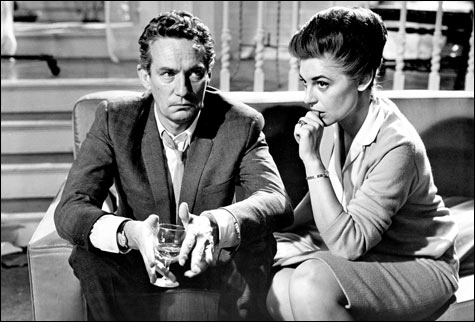
THE PUMPKIN EATER: Pure savage dialogue for Peter Finch and Anne Bancroft. |
Of the great modernist playwrights, Harold Pinter has had the most intimate relationship with film, having wrangled with movies and TV, as an adapter or an adaptee, in more than 60 projects over almost 50 years. That includes no fewer than five versions of his abstracted 1957 psychodrama The Birthday Party. (Scandinavians, generally speaking, cannot stop filming Pinter.) It’s easy to see why: he’s the wordsmith who taught culture that dramatic arenas are by definition built out of presumption, questionable faith, and the bottomless mystery of language. The nailbiting bridge between Beckett and Mamet in his plays, Pinter has at the same time been happy to subsume his stylizations to the service of other visions. It’s unlikely that any other screenwriter has adapted as many eminent authors: Kafka, Fitzgerald, Bowen, Hartley, Fowles, Atwood, McEwan, etc., though sometimes the results have resembled the work of any dozen other hyper-literate British writers.
As laid bare in the Harvard Film Archive retrospective that starts this Sunday, Pinter’s career in movies is spotty. Of course, the blame for the failure of such films as Elia Kazan’s THE LAST TYCOON (1976; May 27 at 7 pm and May 28 at 5 pm) rarely falls on the scriptwriter, particularly one who’s established as a theatrical pioneer, and who’s famous as well for writing what’s been published as The Proust Screenplay, an unproduced adaptation that’s occasionally hailed as the greatest screenplay ever written. (One supposes you’d have to finish reading Proust, as I haven’t, to assess that claim.) Winning a Nobel late in the day clinches the deal.
But the contribution Pinter’s voice made to the ’60s British New Wave is indelible. His partnership with Joseph Losey virtually defined British cinema between 1963 and 1970, and that definition became one of the New Wave era’s most caustic portraits of national consciousness anywhere. There’s an element of disenchantment in the johnny-come-lately American and German New Waves, but for the most part it was the Brits whose films rummaged through their own society’s closet of prejudices and injustices and hung it all out to dry like plucked chickens. The biggest bone of contention was class. THE SERVANT (1963; May 25 at 7 pm and May 26 at 9 pm) remains both its director’s and its screenwriter’s pre-eminent work, a methodical, shadowy sociological knife fight between a wealthy, complacent bachelor (James Fox) and his hired manservant (Dirk Bogarde), who acts like a polite agent of low-birth political chaos, maliciously challenging every tenet of power and privilege the upper classes hold dear. Subtle but as forceful as a plank to the face, The Servant might be the toughest-minded and, outside of Powell & Pressburger, the most resonant British film of the post-war era.